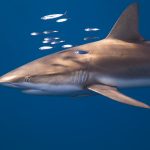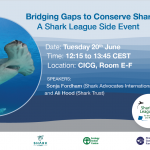Makos, Wedgefishes, and Giant Guitarfishes listed under CITES with support from more than 100 countries
Conservation groups are praising today’s
confirmation that all species of Wedgefishes, Giant Guitarfishes, and Mako
Sharks will be added to Appendix II of the Convention on International Trade in
Endangered Species (CITES). The listings mandate that countries track exports
as well as high seas take, and demonstrate that internationally traded products
from these species are legally sourced from sustainable fisheries.
“Today’s decisions offer promise
of a brighter future for these highly threatened shark and ray species, as international trade has been
a major factor in depletion of their slow growing populations,” said Sonja
Fordham, President of Shark Advocates International, a project of The Ocean
Foundation. “CITES listing can help end unsustainable use of Makos, Wedgefishes,
and Giant Guitarfishes by prompting improved trade data and much-needed limits
on exploitation, while complementing other conservation commitments. As fishing
is the main threat to sharks and rays, it’s essential that countries’ CITES
representatives work with their national fisheries agency counterparts to
ensure that the new obligations are carried out over the coming months.”
Shortfin Makos, exceptionally
valuable and vulnerable oceanic sharks, are at risk from targeted and
incidental fishing driven by demand for meat and fins. A lack of limits on take
is leading to overfishing and a worldwide decreasing trend. Both the Shortfin
Mako and the rarer Longfin Mako Shark are classified as Endangered on the IUCN
Red List.
The North Atlantic offers the
clearest case of Shortfin Mako overfishing and decline. In 2019, scientists associated with the International
Commission for the Conservation of Atlantic Tunas (ICCAT) reported that North
Atlantic Shortfin Mako catches need to be cut by roughly an order of magnitude (~3000 to ~300
tonnes per year) to give the population a decent (60%) chance of recovering within five decades. Taking into account
incidental mortality, ICCAT scientists are recommending a complete ban on North
Atlantic Shortfin Mako retention.
“Considering that Spain leads the world in Mako Shark
landings, we’re encouraged that the European Union co-sponsored the proposal to
list Makos under CITES,” said Ali Hood, Director of Conservation for the Shark
Trust. “We urge the EU to underscore this commitment through proposals to
immediately ban North Atlantic Shortfin Mako retention and establish concrete
catch limits to ensure Mako landings from all other oceans are sustainable. As
virtually all fishing countries are CITES Parties, we’ll be watching for
support for such Mako limits at regional fisheries bodies around the world,
starting with ICCAT in November.“
Wedgefishes and Giant Guitarfishes, collectively
known as Rhino Rays (after their pointy snouts), are considered the world’s
most threatened marine fishes. All but one of these 16 shark-like ray species
have been classified as Critically Endangered on IUCN Red List. Their fins are among the most valuable in the
global shark fin trade. The coastal fisheries that target or retain Rhino Rays
as bycatch are poorly monitored, essentially unregulated, and increasingly
intense.
“Rhino Rays are seriously threatened by demand for
fins and food, but these extraordinary species have the potential to offer long-term,
sustainable benefits as key attractions for ecotourism, particularly in the
Indo-Pacific region,” said Ian Campbell, Associate Director for Project AWARE.
“We are deeply grateful to the many divers who joined us in voicing support for
the CITES listings. We now look forward to working with this network and our
other partners toward ensuring prompt and full implementation of the
international conservation commitments made today.”
Media contact: Patricia Roy email: patricia@communicationsinc.co.uk, Tel: +34 696 905 907
Additional information: www.globalsharksraysinitiative.org/news-publicationswww.sharkleague.orgwww.redlist.org
Download press release here


